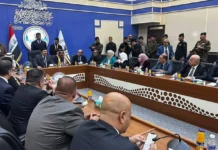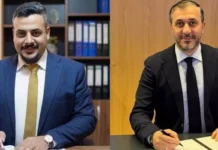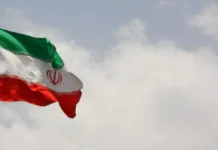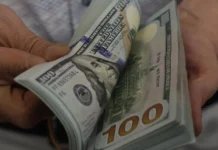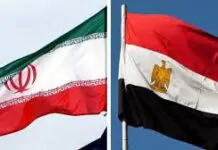Tishwash: Nechirvan Barzani talks about a historic step: Iraq will be more prosperous
Kurdistan Region President Nechirvan Barzani stressed today, Saturday, that the path of development is a historic step towards building a more prosperous Iraq.
Barzani said in his speech during the Baghdad Dialogue Conference, “We support the development path project to strengthen Iraq as an effective state in the Middle East. We in the Kurdistan Region always believe that political and economic stability for all of Iraq is a national interest, and that true development cannot be achieved without integration between Baghdad and Erbil, as well as between Iraq and its surrounding countries in the region and the world.”
He added, “This conference emulates Iraq’s vision for regional opening and integration, and the sustainability of Iraq requires cooperation and partnership, not conflict and restriction.
From this standpoint, the Development Road Project comes as an initiative and a historic step to build a more stable and prosperous Iraq on diverse economic foundations, regional openness, and integration with neighboring countries. link
***************
Clare: Iraq invites Japanese companies to invest, confirms readiness for new economic phase
The Senior Undersecretary of the Ministry of Foreign Affairs, Ambassador Mohammed Bahr Al-Uloom, confirmed today, Friday, that Japan has contributed to the reconstruction of Iraq with 34 vital projects, while calling on Japanese companies to invest in Iraq.
Bahr Al-Uloom said, during the celebration of the Japanese Emperor’s birthday and the National Day: “The relations between Japan and Iraq are historical and date back to 1939,” praising “the development witnessed by these relations to reach the level of fruitful diplomatic partnership.”
He added that “the name of Japan is associated in the Iraqi memory with the meanings of loyalty, honesty and efficient performance, in addition to the lofty human values that are consistent with our Arab and Islamic values and our ancient civilization in Mesopotamia, especially in the Sumerian and Babylonian civilizations.”
He added that “the high level of civilization that Japan has achieved in the fields of economy, construction, industry and technology was not a coincidence, but rather the result of strenuous efforts made by successive generations of the Japanese people, deriving determination and strength from Japan’s ancient civilization,” explaining that “Japan contributed to supporting the march of freedom and democracy in Iraq after 2003, and participated with its forces in maintaining security and stability in Muthanna Governorate, an unprecedented step that left a unique humanitarian impact on the residents of the governorate.”
He stated that “the two countries share in supporting each other diplomatically in international forums and UN institutions,” noting that “Japan provided grants and development loans to Iraq, which contributed to the construction and rehabilitation of 34 vital projects in various Iraqi cities and regions.
The most prominent of these projects is the establishment project, which is the most recent in the Middle East and the first in Iraq to convert oil waste into high-quality derivatives, which is being implemented by the Southern Refineries Company in cooperation with the leading Japanese company “JGC”, and will provide thousands of job opportunities in Basra Governorate.”
He stressed that “Iraq today faces new horizons of cooperation that carry promising opportunities thanks to its stability and development in the security and economic fields, which makes it a fertile and attractive environment for investment,” calling on “leading Japanese companies to be a strategic partner in this new phase of Iraq’s economic renaissance, inspired by the successful Japanese experience in development and progress.”
Bahr al-Uloom expressed his “admiration for the Japanese development experience,” pointing to “the similarities between the two countries in geopolitical challenges.”
He explained that “Iraq seeks to benefit from the distinguished Japanese model by expanding areas of cooperation and exchange of expertise,” explaining that “the investments of Japanese companies in Iraq are not just a strategic choice, but rather part of the modern economic vision adopted by Iraq under the leadership of Prime Minister Mohammed Shia al-Sudani.”
Bahr al-Uloom pointed to “the remarkable growth in trade cooperation between the two countries in recent years,” stressing that “Iraq seeks to enhance this cooperation to include larger projects that have a greater impact on the welfare of the two peoples and the stability of the region.”
He announced “Iraq’s desire to expand areas of partnership,” calling on “Japanese companies and institutions to intensify their presence in Iraq.” link
************
Tishwash: The United Nations announces its support for Iraq in recovering its smuggled funds and combating cross-border corruption
The Deputy Representative of the Secretary-General of the United Nations, Ghulam Mohammad Ishaqzai, expressed his readiness today, Friday, to remove the obstacles that prevent Iraq from recovering its smuggled funds.
The head of the Federal Integrity Commission (Mohammed Ali Al-Lami), according to a statement by the Integrity Commission received by (Al-Mada), stressed “the importance of cooperation with international organizations to recover Iraq’s smuggled funds, indicating that corruption and the smuggling of its proceeds have become problems that cross borders and continents and require international cooperation to limit them.
During his meeting with (Ghulam Mohammad Ishaqzai), Deputy Special Representative of the Secretary-General of the United Nations for Iraq, Al-Lami praised the programs launched by the organizations affiliated with the United Nations and their assistance to Iraq in various fields after 2003; to overcome the problems and dilemmas left by the dictatorial regime and to support state institutions to advance them after the damage they suffered after the change, noting that Iraq is one of the first countries to join the United Nations and the treaties and agreements emanating from it, including the United Nations Convention against Corruption.
Al-Lami expressed his “hope that international organizations would help Iraq recover its funds that were looted before 2003, and for which binding resolutions were issued by the UN Security Council, pointing to the establishment of the Iraq Fund Recovery Fund to recover all financial rights of the Republic of Iraq that were obtained by others through illegal means; as a result of the misuse of the Oil for Food Program, the blockade, smuggling, economic sabotage, or exploitation of the sanctions imposed on Iraq; to achieve financial gains at the expense of the Iraqi people.”
He stressed the need to implement international resolutions and restore Iraq’s money, in order to invest it in the reconstruction process, build infrastructure and achieve development.
For his part, Ghulam Mohammad Ishaqzai, Deputy Special Representative of the Secretary-General of the United Nations, expressed his “readiness to overcome the obstacles that prevent Iraq from recovering its smuggled funds, and to continue cooperating with the Iraqi oversight agencies to hold workshops and seminars to develop their staff and increase their expertise in the field of preventing, combating, and prosecuting corruption perpetrators.”
He praised “the pioneering experiences of the Iraqi Integrity Commission, stressing the importance of establishing strategic partnerships with the Commission based on the experiences gained by the organizations affiliated with the United Nations in dealing with international files in various parts of the world. link


